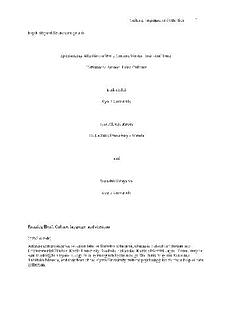
Spontaneous Attention to Word Content Versus Emotional Tone: Differences Among Three Cultures PDF
25 Pages·0.226 MB·English
Most books are stored in the elastic cloud where traffic is expensive. For this reason, we have a limit on daily download.
Preview Spontaneous Attention to Word Content Versus Emotional Tone: Differences Among Three Cultures
Description:
A Stroop interference task was used to test the hypothesis that people in different cultures are differentially attuned to verbal content vis-a-vis vocal tone in comprehending emotional words. In Study 1, Americans showed a greater difficulty in ignoring verbal content (which reveals an attentional bias for verbal content): but Japanese showed a greater difficulty in ignoring vocal tone (which reveals a bias for vocal tone). In Study 2. Tagalog-English bi-linguals in the Philippines showed an attentional bias for vocal tone regardless of the languages used, suggesting that the effect is largely cultural rather than linguistic. Implications for culture and cognition research are discussed.
See more
The list of books you might like
Most books are stored in the elastic cloud where traffic is expensive. For this reason, we have a limit on daily download.
